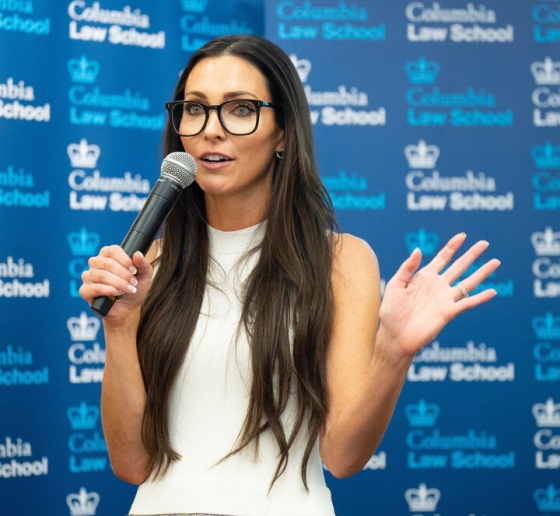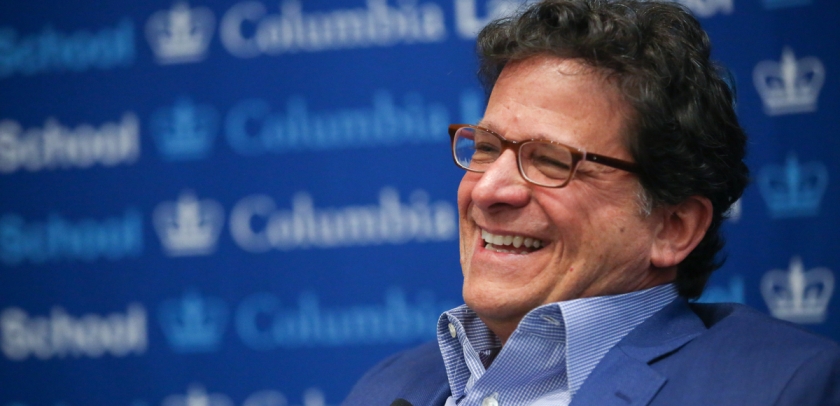Alumni Speaker Series: Michelle Hull Hyncik ’11 on a Career in Professional Sports
With leadership roles that have included in-house senior counsel for Major League Soccer and president of the National Women’s Soccer League’s Utah Royals, Hyncik discussed the array of opportunities for lawyers in the sports world.

When Michelle Hull Hyncik ’11 arrived as a student at Columbia Law School in 2008, after four years playing on the Harvard College women’s soccer team, she felt somewhat adrift. “Being a soccer player was my entire identity, and this was the first time I was in school and not an athlete,” she told a standing-room-only crowd of Columbia Law students at an Alumni Speaker Series event on September 23. “I knew that I had to get back into sports.”
As a Columbia Law student, Hyncik kept a foot in the sports world by serving as president of the Entertainment, Arts, and Sports Law Society, where she made lasting friends like Ted Tywang ’12, currently the general counsel of the Cleveland Browns. Hyncik also wrote a note for The Columbia Journal of Law & the Arts—“Sports Leagues’ New Social Media Policies: Enforcement under Copyright Law and State Law”—that was cited in 2012 in a U.S. Court of Appeals for the 2nd Circuit decision, which she said was a noteworthy accomplishment to put on her résumé.
Nonetheless, Hyncik—who until recently served as president of the National Women’s Soccer League’s Utah Royals—said she did not pursue a job in sports law immediately after graduation. She went to work at WilmerHale in New York, where she specialized in regulatory work for financial institutions such as J.P. Morgan and UBS and quickly rose to senior associate. “But financial institutions weren’t what excited me to get out of bed every morning,” she said.
After nearly four years in Big Law, Hyncik was ready for a new position that aligned with her passion for sports. She began sending résumés to U.S. professional sports leagues and Googled teams to see if they had open jobs. She also asked the Columbia Law Office of Development and Alumni Relations and Office of Private Sector Careers to help her make connections. “I always felt their doors were wide open,” she said.
Eventually, she landed a job as in-house counsel for Major League Soccer (MLS). “I had no idea what I was doing at first! I had never been in-house before,” she said. But, she told students, working at WilmerHale provided an “invaluable” experience. “One thing I’ll say about firms is they really train you on attention to detail, your work product, your communications skills,” she continued. “It helps you build your confidence as a lawyer.”
Still, Hyncik was surprised by the “havoc and mayhem and craziness” of working in-house for a sports organization. “You could be working in six different practice areas in a day,” she said. “The biggest transition was trying to become comfortable with being uncomfortable, being vocal about what you don’t know, and asking questions and asking for help when you need it.”
After five years at MLS, Hyncik moved to Utah to be general counsel for Real Salt Lake, the MLS men’s team, which was another “massive” transition. “At the league, you’re hyperfocused on the strategic five-year plan and the league’s goals,” she said. “Whereas at the team level, you are very operational and running multiple events, more or less, every week. … So while there’s a ton of movement between leagues and clubs, they’re very different in what you do day to day.”
It was an especially complicated time to join Real Salt Lake because its sister team, the Royals, was decamping for Kansas City, where it was renamed the Current, leaving Utah fans without their beloved women’s team. When Real Salt Lake was bought in 2022 by David Blitzer and Ryan Smith (owner of the NBA’s Utah Jazz), they decided to relaunch the Royals franchise; they tapped Hyncik to be president of the new team and gave her one year to have the Royals ready to compete. She had to build an entire organization from scratch—from hiring coaches, signing players, and staffing the front office to negotiating sponsorship deals and commercial partnerships.
It was yet another big transition. “I’d never run a budget before,” she said, adding that her ultimate responsibility was “revenue, revenue, revenue.” But, she said, the hardest part was the role reversal. “Probably my favorite part of being a lawyer is being in that advisory role where you’re counseling, offering the pros and cons, and saying, ‘This is what I think you should do,’” she said. “And in the president’s role, I needed people giving me advice.”
Hyncik recently was elevated to the Royals’ ownership level in a new role as general counsel for the family office of Royals co-owner Blitzer, global head of tactical opportunities at Blackstone. (The multifaceted job was so new that at the time of the Law School event, she was still negotiating her title.) There, she will be even more immersed in professional sports because the office has an ownership stake in teams in the four major North American sports leagues: the Cleveland Guardians (Major League Baseball), the New Jersey Devils (National Hockey League), the Philadelphia 76ers (National Basketball Association), and the Washington Commanders (National Football League).
Hyncik encouraged Columbia Law students who want a career in sports to take advantage of being in New York. “You have all the major sports leagues’ headquarters here, which is a phenomenal opportunity that most law students don’t have in their backyard,” she said. Hyncik suggested that interning or getting a job with a company that partners with a major league team—such as Fox Sports, Visa, or Coca-Cola—can be a stepping stone to working for a team or league: “There’s a big revolving door between teams and their partners.”
Although Hyncik describes working in sports as “a fire drill every day,” she said that she wouldn’t trade it for anything. “That’s why I love sports. It’s an adventure. It’s super dynamic.”
